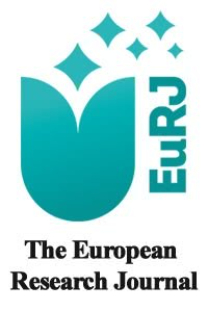Leman Tekin ORGUN, Füsun ATLIHAN, Özgür OLUKMAN, Figen İŞLETEN, Ali ORGUN, Ferah GENEL, Şebnem ÇALKAVUR, İsmail Cengiz ÖZTÜRK, Erhan ÖZBEK
The relationship between hypernatremia and breast milk sodium levels in newborns with hypernatremic dehydration
Objectives: Breast-feeding with high sodium content milk may cause hypernatremic dehydration in neonates (NHD). The number of cases with NHD tends to increase particularly in the higher temperature seasons. In this prospective case-control study, the relationship between NHD and breast milk sodium (Na) levels and demographic features of NHD were investigated during the summer season. Methods: The study included term newborns admitted to the neonatal intensive care unit of our hospital with the diagnosis of hypernatremic dehydration between June 2009 and October 2009. Serum sodium level ≥ 150mEq/L was accepted as hypernatremia. Among 109 NHD patients, breast milk sodium level was evaluated in 50 cases. Term infants without hypernatremic dehydration were taken as the control group (50 cases). Results: Postnatal age at admission ranged between 2 and 12 days and mean serum Na concentration was 152 mEq/L (150-173 mEq/L). A significant weight loss of >10% was determined in 85% of cases. Breast milk Na was significantly higher in the hypernatremic group (24.3 ± 20.3 mEq/L) compared to the control group (12.6 ± 6.79 mEq/L) (p < 0.001). In primiparous mothers, the mean breast milk Na level was statistically higher than that of multipara mothers (21.16 ± 19.9 mEq/L vs 15.48 ± 9.96 mEq/L, p < 0.016). Conclusions: In this study, we demonstrated that high breast milk sodium level was closely related with NHD and being a primiparous mother appeared as a significant factor for high breast milk sodium content. In this respect, all pregnant women especially primiparous should be educated about infant nutrition and neonatal dehydration. Health care providers should emphasize importance of frequent milking and more fluid intake, especially in summer.
Keywords:
Breast milk sodium, hypernatremic dehydration, newborn,
___
- [1] Molteni KH. Initial management of hypernatremic dehydration in the breastfed infant. Clin Pediatr 1994;33:731-40.
- [2] Oddie S, Richmond S, Coulthard M. Hypernatraemic dehydration and breast feeding: a population study. Arch Dis Child 2001;85:318-20.
- [3] Behrman RE KR, Jenson HB. Pathophysiology of body fluids and fluid therapy. In: LA G, editor. Nelson textbook of pediatrics. 19th ed. Philadelphia: Elsevier Saunders; 2011.
- [4] Ergenekon E, Unal S, Gücüyener K, Soysal SE, Koç E, Okumus N, et al. Hypernatremic dehydration in the newborn period and long-term follow up. Pediatr Int 2007;49:19-23.
- [5] Manganaro R, Mami C, Marrone T, Marseglia L, Gemelli M. Incidence of dehydration and hypernatremia in exclusively breast-fed infants. J Pediatr 2001;139:673-5.
- [6] Akgün A, Katar S, Taşkesen M, Özbek MN. [An important problem in neonatal period: Hypernatremic dehydration]. Med Med J 2010;25:126-31. [Article in Turkish]
- [7] Uras N, Karadag A, Dogan G, Tonbul A, Tatli MM. Moderate hypernatremic dehydration in newborn infants: retrospective evaluation of 64 cases. J Matern Fetal Neonatal Med 2007;20:449-52.
- [8] Macdonald PD, Ross SR, Grant L, Young D. Neonatal weight loss in breast and formula fed infants. Arch Dis Child Fetal Neonatal Ed. 2003;88:F472-6.
- [9] Unal S, Arhan E, Kara N, Uncu N, Aliefendioglu D. Breast-feeding-associated hypernatremia: retrospective analysis of 169 term newborns. Pediatr Int 2008;50:29-34.
- [10] Section on B. Breastfeeding and the use of human milk. Pediatrics 2012;129:e827-41.
- [11] Moritz ML. Preventing breastfeeding-associated hypernatraemia: an argument for supplemental feeding. Arch Dis Child Fetal Neonatal Ed 2013;98:F378-9.
- [12] Neifert MR. Prevention of breastfeeding tragedies. Pediatr Clin North Am 2001;48:273-97.
- [13] Livingstone VH, Willis CE, Abdel-Wareth LO, Thiessen P, Lockitch G. Neonatal hypernatremic dehydration associated with breast-feeding malnutrition: a retrospective survey. CMAJ 2000;162:647-52.
- [14] Escobar GJ, Liljestrand L, Hudes ES, Ferriero DM, Wu YW, Jeremy RJ, et al. Five year neurodevelopmental outcome of neonatal dehydration. J Paediatr 2007;151:127-33.
- [15] Erdeve O, Atasay B, Arsan S. Hypernatraemic dehydration in breastfed infants: is caesarean section a risk? Ann Trop Paediatr 2005;25:147-8.
- [16] Krishnamurthy S, Depnath S, Gupta P. Breast feeding-associated hypernatremic dehydration: a preventable tragedy in newborn infants. J Med Case Rep 2001;1:1-5.
- [17] Koo WW, Gupta JM. Breast milk sodium. Arch Dis Child 1982;57:500-2.
- [18] Konetzny G, Bucher HU, Arlettaz R. Prevention of hypernatraemic dehydration in breastfed newborn infants by daily weighing. Eur J Pediatr 2009;168:815-8.
- [19] Laing IA, Wong CM. Hypernatraemia in the first few days: is the incidence rising? Arch Dis Child Fetal Neonatal Ed 2002;87:F158-62.
- [20] Manganaro R, Marseglia L, Mami C, Palmara A, Paolata A, Loddo S, et al. Breast milk sodium concentration, sodium intake and weight loss in breast-feeding newborn infants. Br J Nutr 2007;97:344-8.
- [21] Ingram JC, Woolridge MW, Greenwood RJ, McGrath L. Maternal predictors of early breast milk output. Acta Paediatr 1999;88:493-9.
- [22] Moritz ML, Manole MD, Bogen DL, Ayus JC. Breastfeeding-associated hypernatremia: are we missing the diagnosis? Pediatrics 2005;116:e343-7.
- [23] Bolat F, Oflaz MB, Güven AS, Özdemir G, Alaygut D, Doğan MT, et al. What is the safe approach for neonatal hypernatremic dehydration? A retrospective study from a neonatal intensive care unit. Pediatr Emerg Care 2013;29:808-13.
- [24] Tekgunduz KS, Caner I, Eras Z, Tastekin A, Tan H, Dinlen N. Prognostic value of amplitude-integrated electroencephalography in neonates with hypernatremic dehydration. J Matern Fetal Neonatal Med 2014;27:658-63.
- ISSN: 2149-3189
- Yayın Aralığı: Yılda 6 Sayı
- Başlangıç: 2015
- Yayıncı: Prusa Medikal Yayıncılık Limited Şirketi
Sayıdaki Diğer Makaleler
Leman Tekin ORGUN, Füsun ATLIHAN, Özgür OLUKMAN, Figen İŞLETEN, Ali ORGUN, Ferah GENEL, Şebnem ÇALKAVUR, İsmail Cengiz ÖZTÜRK, Erhan ÖZBEK
Unusual location of lichen striatus in an adult patient
Selami Aykut Temiz, Pembe Oltulu, İlkay Özer, Arzu Ataseven, Recep Dursun
Özcan Erel, Salim Neşelioğlu, Nermin Dindar Badem, Oğuz Eroğlu, Ayşe Baccıoğlu, Ertan Cömertpay
Hasan METİNEREN, Turan Cihan DÜLGEROĞLU
AYSEL BÜLEZ, Esin Çeber TURFAN, Neriman SOĞUKPINAR
Aslı MURATLI, Mehmet Rıza GEZEN
Foot-ankle involvement of complex regional pain syndrome associated with pregnancy
Adem Küçük, Rabia Aydoğan Baykara, Göksel Tuzcu, Pınar Karabacak
